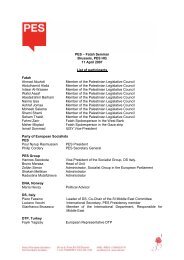Hedge funds and Private Equity - PES
Hedge funds and Private Equity - PES
Hedge funds and Private Equity - PES
Create successful ePaper yourself
Turn your PDF publications into a flip-book with our unique Google optimized e-Paper software.
84<br />
3. The European response – current EU regulation<br />
It’s safe to say that there is a general legal – but not a coherent <strong>and</strong> comprehensive – basis<br />
for the regulation of alternative investment at European level. It’s true that at present no tailormade<br />
legislation exists for it. Although there is European legislation on institutional investors (see<br />
85/611/EEC, the so-called UCITS directive), this does not as a rule apply to investors from the<br />
alternative sector – i.e. neither <strong>Hedge</strong> Funds nor <strong>Private</strong> <strong>Equity</strong> <strong>funds</strong> as such.<br />
UCITS (Undertakings for Collective Investment in Transferable Securities) are specially<br />
constituted collective investment portfolios exclusively dedicated to the investment of<br />
assets raised from investors. Under the UCITS Directive, UCITS investment policy <strong>and</strong><br />
its manager are authorised in accordance with specific requirements. UCITS’ legislation<br />
aims to establish a defined level of investor protection. This is achieved through strict<br />
investment limits, capital <strong>and</strong> disclosure requirements, as well as asset safe-keeping <strong>and</strong><br />
fund oversight provided by an independent depositary. UCITS benefit from a ‘passport’<br />
allowing them, subject to notification, to be offered to retail investors in any EU jurisdiction<br />
once authorised in one Member State.<br />
From the positive experience of the UCITS Directive, the UCITS <strong>funds</strong> developed very well after<br />
the adoption of the Directive in 1985 as it proved to be a very efficient way to develop a real<br />
Single Market for such a financial product while not harming investors’ protection. Thanks to this<br />
Directive, UCITS benefit from a ‘European label/br<strong>and</strong>’, which is now a tool to export pan-European<br />
expertise at worldwide level (e.g. two thirds of <strong>funds</strong> currently registered in Hong-Kong are<br />
European UCITS).<br />
However, there are several limits to the current framework of alternative investments in the EU.<br />
Currently onshore hedge <strong>funds</strong>/<strong>funds</strong> of hedge <strong>funds</strong>/private equity <strong>funds</strong> are fragmented<br />
through divergent national regulations. So, there is still a long way to go, in developing a Single<br />
Market for such onshore alternative investment vehicles.<br />
No actual EU regulatory framework is provided for onshore alternative investments. A good next<br />
question is: what about offshore or non-EU regulated products?<br />
The European Commission (Commissioner McCreevy) wishes clearly to develop the so-called<br />
‘<strong>Private</strong> Placement’: i.e. the ability for a firm registered in the EU to sell any type of product<br />
(including offshore <strong>funds</strong> or non-EU regulated product) in the EU, to so-called ‘qualified<br />
investors’ (i.e. professional investors: insurance companies, pension <strong>funds</strong>, etc).<br />
Our concern is that the final risk will be borne anyway by the end investor (e. g. retirees, retail<br />
investors) as unit-linked life insurance <strong>and</strong> ‘defined contribution’ retirement saving products<br />
develop. Therefore we think that it is necessary to provide a minimum safety net for alternative<br />
products to be sold in the EU.<br />
In addition to giving increased investor protection, a EU regulatory frame for alternative investments<br />
(direct hedge <strong>funds</strong>/<strong>funds</strong> of hedge <strong>funds</strong>; private equity <strong>funds</strong>) could provide a success<br />
similar to the UCITS case. Within the EU, a regulated framework would help develop a Single<br />
Market for alternative investments, with the right level of investor protection <strong>and</strong> possible overseeing<br />
by regulators. Out of the EU, a ‘non-UCITS fund’ Directive would help develop a




